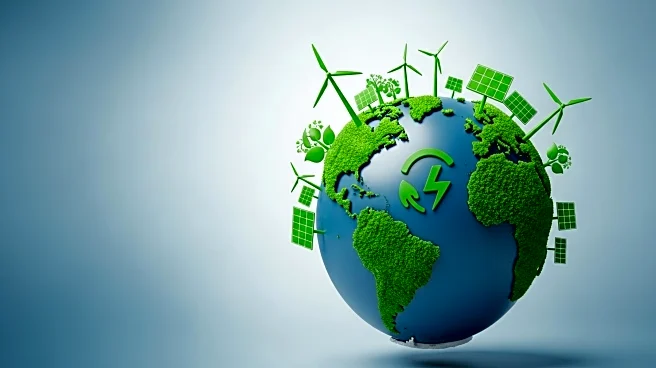What's Happening?
A recent report by risk management firm DNV indicates that the global shift towards cleaner energy sources remains largely unaffected by the United States' recent policy reversals under the Trump administration. The withdrawal of renewable tax credits and the blocking of several large-scale projects have slowed the U.S.'s progress in decarbonization. However, the report suggests that the long-term global energy transition will continue, driven by significant advancements in other regions, particularly China. China has been a major contributor, accounting for over half of the new solar and wind capacity installed this year. The report forecasts that by 2050, fossil fuels and non-fossil energy sources will reach near parity in the global energy mix.
Why It's Important?
The findings underscore the resilience of the global energy transition despite policy setbacks in the U.S. The continued progress in renewable energy adoption, especially in China, highlights the shifting dynamics in global energy leadership. This transition is crucial for reducing carbon emissions and combating climate change. The report also emphasizes the role of energy security policies in driving emission reductions, which have led to increased investments in energy efficiency and low-carbon energy sources. The global energy landscape is evolving, with electricity generation expected to more than double by 2060, significantly increasing its share of total energy demand.
What's Next?
The report suggests that while the U.S. may experience a delay in emissions reductions, the global energy transition will persist. The International Energy Agency (IEA) forecasts a doubling of global renewable generation capacity between 2024 and 2030, despite policy uncertainties and supply chain challenges. As the world continues to pivot towards renewable energy, the role of new technologies, such as electric vehicles and artificial intelligence, will become increasingly significant. These technologies are expected to drive further demand for electricity, adding pressure to power systems but also offering opportunities for innovation and growth in the energy sector.
Beyond the Headlines
The report highlights the potential for new energy technologies to reshape the global energy landscape. The increasing adoption of electric vehicles and the growing role of artificial intelligence in energy consumption are poised to transform how energy is produced and consumed. These developments could lead to significant shifts in energy policy and infrastructure investment, as countries strive to balance energy security with sustainability goals. The report also warns of the potential for global warming to exceed safe levels, emphasizing the need for continued international cooperation and commitment to reducing carbon emissions.









